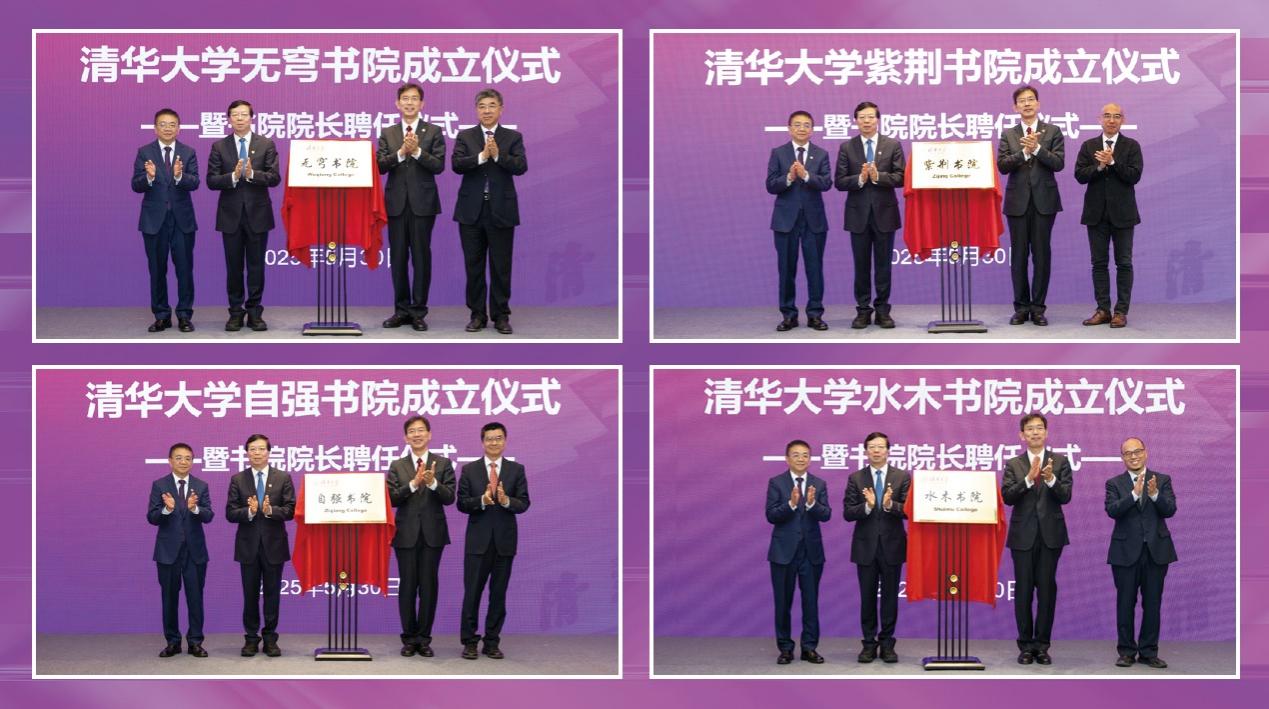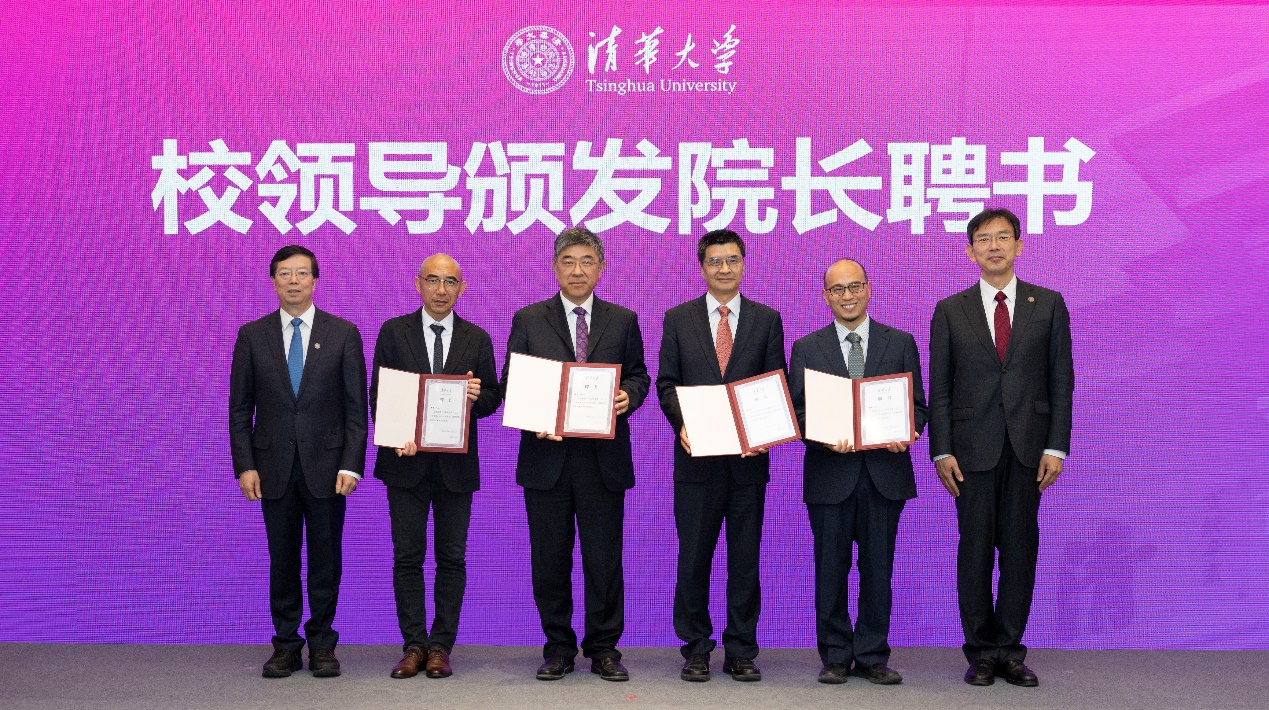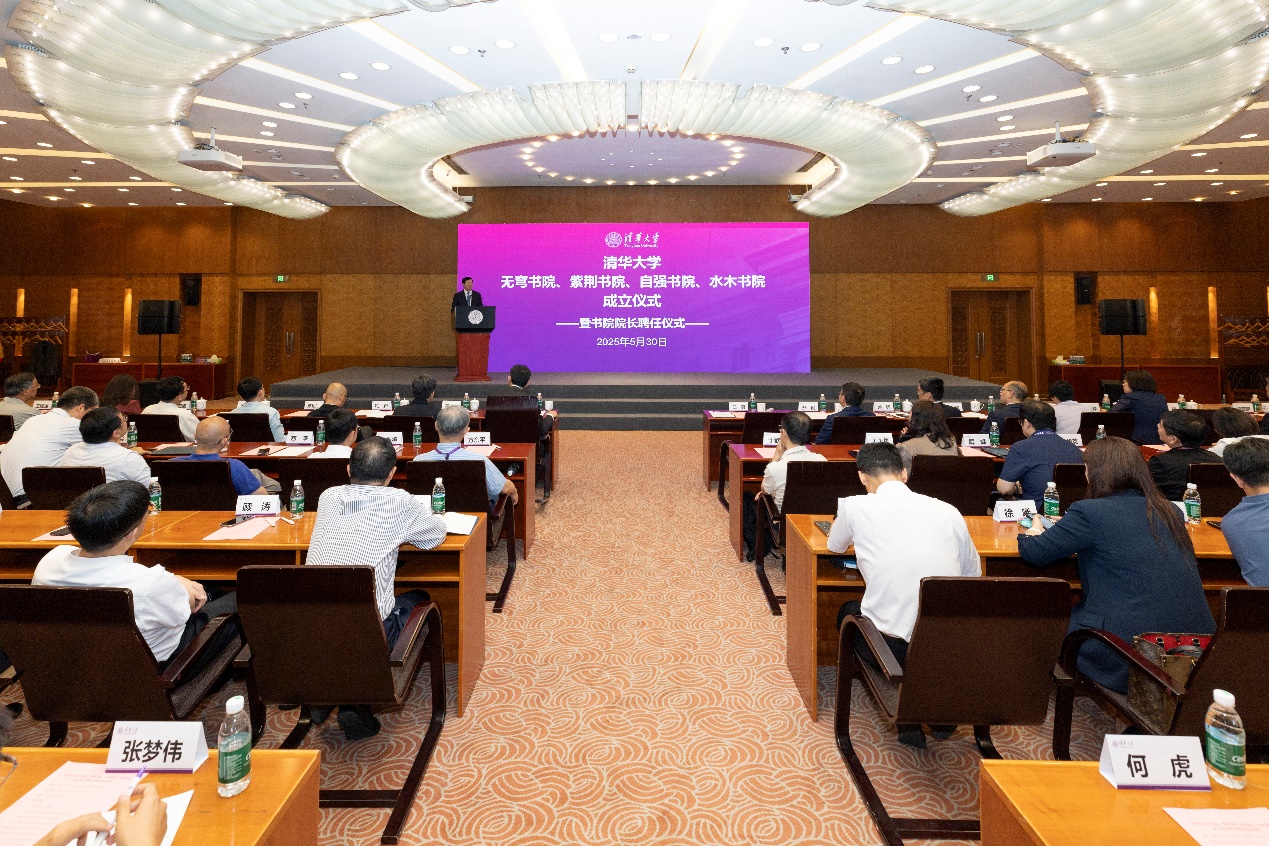On May 30, the inauguration ceremony for Tsinghua University's four residential colleges—Wuqiong College, Zijing College, Ziqiang College, and Shuimu College— and the appointment ceremony for the college deans were held in the Main Building.
The establishment of Tsinghua colleges is a momentous initiative for Tsinghua University. The initiative seeks to further stimulate the University’s vitality through comprehensive reforms and address major national strategic needs and socio-economic development demands.
It also aims to deeply integrate traditional engineering disciplines with artificial intelligence, enhance the quality and efficiency of independent talent cultivation, and pioneer new frameworks for holistic education.
Qiu Yong, secretary of the CPC Tsinghua University Committee, attended the ceremony and delivered a speech, while Li Luming, president of the University, announced the official establishment of the four residential colleges and the appointments of their deans. Peng Gang, vice-president of the University, presided over the ceremony.

The inaugurated residential college plaques are unveiled.

Deans of the inaugurated residential colleges are appointed.
During the ceremony, Qiu, Li, and Peng unveiled plaques for the four residential colleges alongside Dean Zheng Li of Wuqiong College, Dean Zhang Li of Zijing College, Dean Yao Qiang of Ziqiang College, and Dean Feng Peng of Shuimu College. Qiu and Li presented appointment letters to the four new deans.
Qiu said that teaching and nurturing talent is a long-term endeavor, and Tsinghua University is committed to being an active reformer and practitioner of innovation. Since 2014, the University has been exploring the development of Tsinghua residential colleges. In 2020, it established five colleges to accelerate the process.
The establishment of the four new colleges will accelerate the development of a Tsinghua residential college education system. Through continuously developing innovative educational concepts, theories, and practices, this initiative aims to cultivate strategic national talent and high-demand specialists, bolster the University's contribution to high-quality development, and elevate its standing as a world-class institution through service to the nation’s progress.
The entire University must further consolidate consensus and mobilize its collective strength, staying on the right course and seeking to break new ground, and further deepening comprehensive reforms, he added. It is essential to advance the Tsinghua residential college system, enhance coordination across all educational resources, and form a collaborative educational framework between colleges and academic departments. These efforts will continuously translate disciplinary strengths into excellence in talent cultivation, establishing a new paradigm for holistic education that integrates virtue and intellect.
In his announcement, Li stressed the imperative to prioritize the fundamental mission of holistic education, reaffirming the consensus that "first-class undergraduate education constitutes both the foundation and hallmark of a first-class university."
Li stated that the University will leverage its comprehensive disciplinary strengths to advance the development of an undergraduate teaching system grounded in general education and the integration of broad and specialized education. The initiative aims to develop and perfect the Tsinghua residential college system, cultivating top-tier innovators with solid theoretical foundations and exceptional practical capabilities for the nation.

An inauguration ceremony for Tsinghua University's four residential colleges is held on May 30.
Zheng, Zhang, Yao, and Feng, the four deans, each delivered a speech, introducing the talent cultivation goals, models, and characteristics of their respective colleges.
Wuqiong College focuses on core innovations and applications of artificial intelligence, aiming to cultivate a new generation of AI leaders with scientific spirit, humanistic cultivation, and global competitiveness.
Zijing College integrates artistic and creative elements into broad-based science and engineering education, developing international engineering innovation leaders with cross-cultural coordination skills and interdisciplinary practical capabilities.
Ziqiang College aims to build a new "Intelligent+" engineering education system, leveraging multidisciplinary strengths to nurture innovation leaders for the smart energy sector.
Shuimu College, characterized by the model of "AI-driven Engineering + Management," aims to meet long-term societal needs and major engineering demands to cultivate future engineering leaders.
Heads of relevant departments and administrative offices attended the event.
Related news:
In recent years, Tsinghua University has continuously deepened its educational and teaching reforms, steadily advancing the development of a Tsinghua residential college system. In 2014, Tsinghua established its first undergraduate residential college, Xinya College, marking the exploratory phase of Tsinghua colleges development.
In 2020, the university fully implemented the national "Strengthening Foundation Plan" by establishing five colleges, namely Zhili, Rixin, Weiyang, Tanwei, and Xingjian, signifying the rapid development phase of the Tsinghua residential colleges. Subsequently, the University established Qiuzhen College, Weixian College, Xiuzhong College, Dushi College, and Zhishan College. In 2022, a university-level working group for college development was formed to further enhance top-level design and stimulate the enthusiasm and initiative of departments in participating in Tsinghua residential college development.
For more than a decade, Tsinghua colleges have developed new educational concepts and methods, with educating people as the sole purpose.
They have practiced the talent cultivation philosophy of "broad foundation, deep integration, and interdisciplinary emphasis" by breaking down disciplinary barriers and integrating educational resources across departments. It has encouraged students to engage in scientific research at an early stage.
Following the educational principle of teaching students according to their aptitude, they have implemented personalized training programs under mentor guidance, which help guide students to establish a correct growth perspective and combine individual growth with collective growth.
They have advocated a culture of "the great fish leads, the small follows,", fully implementing the advisor system, shortening the distance between teachers and students, and creating a warm educational environment. This approach aims to cultivate proactive learning and growth, fostering independent thinking and research abilities.
The inauguration of these four colleges will further expand and improve the professional setup and educational system of Tsinghua colleges.
Wuqiong College, with the philosophy of "intelligent literacy, mathematical foundation, problem orientation, and collaborative evolution," will break down disciplinary barriers, allowing AI to spark transformative innovations across fields such as science, engineering, humanities, and medicine. By closely collaborating with relevant university departments and industries, the aim is to cultivate AI leaders with the most innovative capabilities in the most AI-driven way.
Zijing College is characterized by internationalization, creative engineering thinking, and scenario-based small-class teaching, which allows students to choose their own development path within a curriculum system that integrates design science, construction engineering, manufacturing engineering, and information science technology, forming a personalized knowledge system. It will enroll undergraduate students both domestically and internationally.
Ziqiang College focuses on "smart energy," integrating six emerging directions such as smart grids, with classic disciplines like electrical engineering, further broadening student development paths.
Shuimu College, characterized by the model of "AI-driven Engineering + Management," emphasizes "interest-driven, self-selected topics, one-person-one-plan," customizes students’ academic training plans based on future-oriented research topics, and relies on major engineering practices and high-level laboratory research to guide students in accomplishing unprecedented endeavors.
Tsinghua University to date has 15 residential colleges responsible for undergraduate education. It is estimated that nearly 60% of the 2025 cohort will enter the residential colleges.
Editors: Li Han, JP

